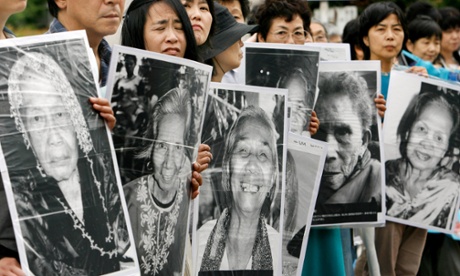Among the significant thorns in bilateral relations remains the question of adequately compensating and apologizing to now elderly former sex slaves who served during Japan’s 1910-45 colonization of the Korean Peninsula.
Addressing reporters, Seoul’s presidential spokesperson Min Kyung-wook urged Tokyo to swiftly address the issue, emphasizing the age of surviving ‘comfort women’ — at an average of 88-years-old, their number has fallen from 120 to 55 since 2007.
The Imperial Japanese Army is estimated to have forced up to 200,000 women from Korea and elsewhere in Asia into wartime sexual slavery before and during World War II.
While Tokyo asserts that matters related to its colonization of Korea were settled when they normalized ties in 1965, Japan did move toward a position of atonement in the 1990s.
Conservative politicians in the country, however, have been accused of repeatedly downgrading previous statements of apology. Japan’s current Prime Minister Shinzo Abe, for instance, drew criticism from South Korea and China after a December 2013 visit to the controversial Yasukuni Shrine that pays tribute to the country’s war dead – including several war criminals from World War II.
Abe will have the opportunity for a definitive say on the issue Aug. 15, when he is expected to issue a statement in recognition of the 70th anniversary of Japan’s World War II defeat — and of South Korea’s liberation from Tokyo’s rule.
With 2015 also marking 50 years since the establishment of Seoul and Tokyo’s diplomatic relationship, pressure has been building for Abe and South Korean President Park Geun-hye to officially hold talks for the first time.
Earlier in the week, Park warned during a televised address that there would be a “heavy historical burden on Japan” if Abe failed to atone sincerely for his country’s past – the South Korean leader also suggested that changes were needed “in Japan’s stance” for a summit to take place.
Such high-level talks had been proposed by the Japanese prime minister back in October via a parliamentary delegation.
It also emerged Friday that the two sides will resume dialogue in a sixth round of ‘comfort women’ talks at the start of next week.
South Korean’s foreign ministry announced that Seoul’s chief delegate to the talks, Lee Sang-deok, will meet with his Japanese counterpart Junichi Ihara in Tokyo on Monday to discuss the issue.
While little progress has been reported since the series of meetings began last April, this year could mark a turning point in Seoul-Tokyo ties.
[adrotate banner=”46″]
 South Korea intensified calls for Japan to face up to their shared brutal history Friday, as momentum has been building toward a first summit between the countries’ present leaders.
South Korea intensified calls for Japan to face up to their shared brutal history Friday, as momentum has been building toward a first summit between the countries’ present leaders.